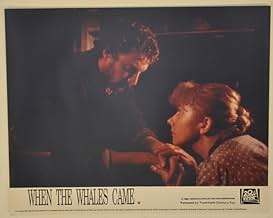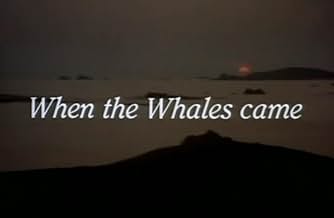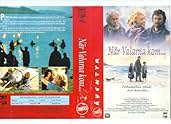Füge eine Handlung in deiner Sprache hinzuA pair of children befriend an eccentric old man, who lives isolated on the far shore of their island home. But it turns out that the old man knows a terrible secret about the island and the... Alles lesenA pair of children befriend an eccentric old man, who lives isolated on the far shore of their island home. But it turns out that the old man knows a terrible secret about the island and the narwhales who sometimes come. Meanwhile, World War I is making life hard in the village.A pair of children befriend an eccentric old man, who lives isolated on the far shore of their island home. But it turns out that the old man knows a terrible secret about the island and the narwhales who sometimes come. Meanwhile, World War I is making life hard in the village.
- Auszeichnungen
- 3 wins total
Empfohlene Bewertungen
From a film perspective, I enjoyed seeing Helen Mirren in a film from the late 80s (which this is). I hadn't seen her in many roles from over 2 decades ago - thats why I decided to watch this film. The music isn't too 'in your face' I'd say, its perhaps a little over sentimentalised maybe, but only just - it certainly didn't put me off the film to any large extent. It also pushes home the optimistic elements of the story, which was nice. Overall I'd say its worth a watch.
This film about life on a remote, barren English island during WWI (it is by no means a war flick) is, in words of one, MAGNIFICENT. The direction, superb photography, excellent music (unobtrusive, unlike too many of today's noisy movies) and the acting all combined to choke you up, or bring tears to your eyes, depending on your level of emotion.
This well told, beautiful tale has the big plus of some fine, fine performers, particularly the youngsters Helen Pearce and Max Rennie. For whatever ungodly reason neither of these two achieved any kind of fame. Young Max only made one other movie, "Hard Road," while Helen did nothing else.
Both youngsters received the Young Artists Award, an honorary but justified recognition.
Paul Scofield and Helen Mirren the entire cast were heavily responsible for the success of this G-rated movie.
The accents were not too heavy so, no problem in understanding. It was a tad slow at first, but that is nit-picking. Overall, it can be rated as one of the best movies of its kind hell, any kind ever made.
Today the main industries of the Scillies are tourism and growing flowers, particularly daffodils, for the cut-flower market, but during the 1910s, when the action of this film takes place, life on the islands was hard. The inhabitants survive on fishing and small-scale subsistence agriculture. The central characters are Gracie Jenkins and Daniel Pender, two children living on the island of Bryher, who befriend a reclusive elderly man known as "the Birdman". (His real name is Mr Woodcock; in the book his Christian name was Zachariah, but this is not used in the film). The Birdman is shunned by the other inhabitants of Bryher, partly because they believe him to be mad but also because he is the last surviving native of Samson, which he left as a small boy. The people of Bryher avoid Samson, which they believe to be an accursed place, haunted by the ghosts of its former residents. When war breaks out, the Birdman comes under greater suspicion than ever, because the locals believe him to be a German spy.
Of course, the Birdman proves to be far from mad, and certainly not a spy. Indeed, he is probably the sanest person on the island. It is from him that we learn how Samson came to be cursed and why its inhabitants were forced to leave. (And in this version it was something very different from the whims of an eccentric landowner). He treats Daniel and Gracie like the children or grandchildren he never had and he in turn becomes their trusted friend and confidant. He is a talented woodcarver, and teaches his skills to the children. The crisis of the story comes when, after a storm, a narwhal is discovered stranded on the beach. The people of Bryher want to slaughter it, and other members of its pod should they come ashore, but the Birdman and the children desperately try to dissuade them.
The late Paul Scofield was one of the major names of the British acting profession, but most of his work was for the stage and he made comparatively few films. Film buffs will probably know him best for his masterly performance as Thomas More in "A Man for All Seasons", but the one he gives here can stand comparison with it. Of the other adult cast members the best is probably Helen Mirren as Gracie's mother, but special mention must also be made of the enchanting Helen Pearce and Max Rennie as the two children. Another feature of the film is its strikingly beautiful photography of the islands.
The plot is a simple one, reminiscent of a folk tale. Deceptively simple, because Morpurgo is able to use it to explore some surprisingly deep themes- relationships between man and nature, relationships between the generations, the treatment of those like the Birdman who are thought to be "alien" to the mainstream of the community within which they live and the origins and nature of violence. These themes are seen to be interrelated; there are clear parallels between on the one hand the islanders' hostility towards the Birdman, partly rooted in the fact that he is originally from another island less than a mile away, and their threatened violence towards the narwhals, and on the other the mutual hostility between the British and the Germans and the violence to which it has led.
I have never really known why "When the Whales Came" is so little known; I note that it has only received thirteen earlier reviews. To my mind it is one of the great movies made during the remarkable renaissance of the British cinema industry of the 1980s, able to stand comparison with the likes of "The Elephant Man", "Chariots of Fire", "The Mission", "A Private Function" and "Shirley Valentine". Perhaps adults tend to dismiss it as "a children's film", but there is a lot here (as there is in Morpurgo's book) that deals with some very adult concerns. 10/10
Gracie and Daniel are two children living in this impoverished island fishing community. The local school is stern, Daniel's father is sterner.
Gracie faces tragedy as her father went off to fight in the war and was reported to be killed.
Both children befriend Birdman (Paul Scofield.) This deaf old man lives an isolated life, doing wood carvings.
When Birdman finds a beached whale, he wants to push it back out to the sea. The islanders wants the whale for the money it will bring them.
The Birdman tells a story of what happened when the last time the whales were beached up in Samson. He was a little boy then and greed bought tragedy with it.
With eerie, haunting music, this is charming simple tale with an ecological subtext. It is a bit slow to get going.
It portrays life in this gloomy harsh small island environment. Even in 1914, Gracie's father is fearful what life is going to be like for his child when she grows up.
Wusstest du schon
Top-Auswahl
- How long is When the Whales Came?Powered by Alexa
Details
- Erscheinungsdatum
- Herkunftsland
- Sprache
- Auch bekannt als
- When the Whales Came
- Drehorte
- Produktionsfirmen
- Weitere beteiligte Unternehmen bei IMDbPro anzeigen
Box Office
- Bruttoertrag in den USA und Kanada
- 73.131 $
- Eröffnungswochenende in den USA und in Kanada
- 37.030 $
- 22. Okt. 1989
- Weltweiter Bruttoertrag
- 73.131 $
- Laufzeit1 Stunde 40 Minuten
- Farbe
- Sound-Mix
- Seitenverhältnis
- 1.85 : 1



























